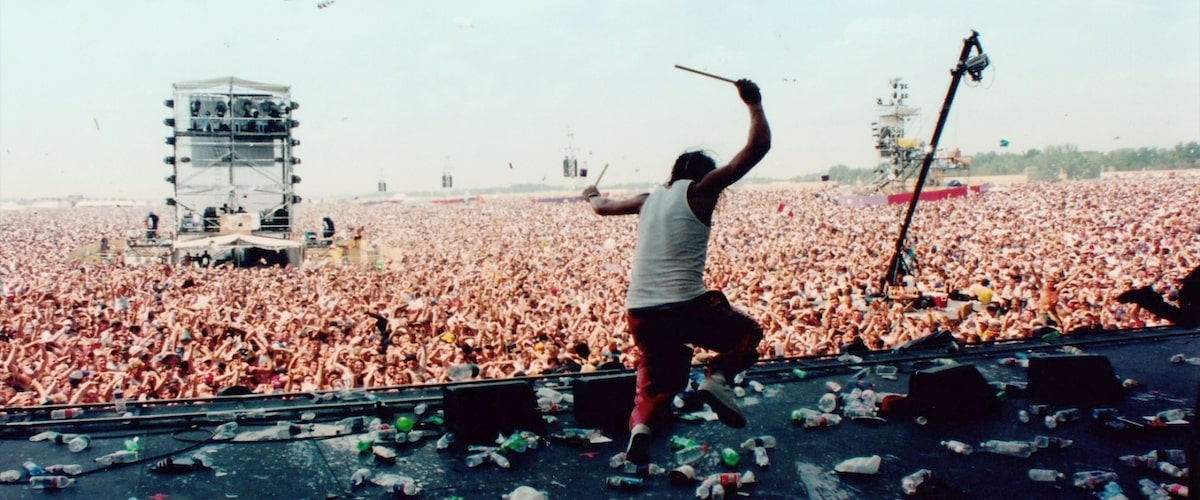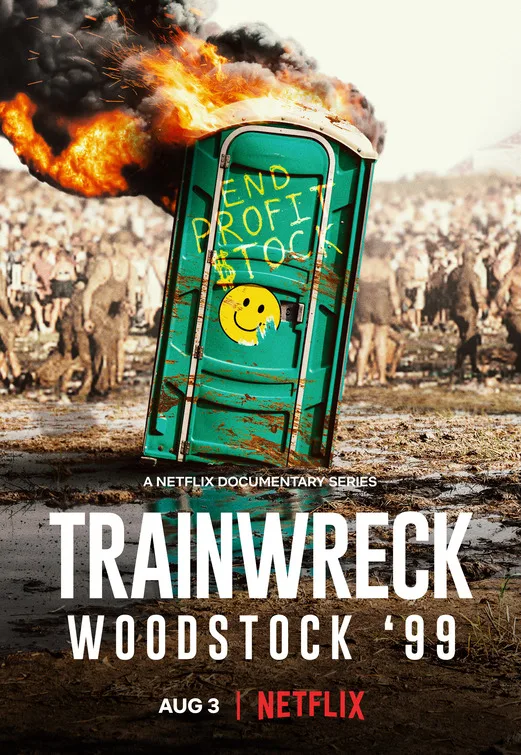“Trainwreck: Woodstock ’99” is a true piece of docutainment, a documentary meant to amuse and mortify more than so much make insight into the infamous music festival that was doomed from the start. But its assembly does a good job at covering different key elements, jumping back and forth on the timeline, creating a sense of a terrible infrastructure that was far removed from the original 1969 festival’s mentality. This is a clear-cut saga about eternal greed and people being removed from reality, but it’s also about historic music performances. As many first-hand witnesses say about this saga, it was a roller coaster experience, and “Trainwreck: Woodstock ’99” has those big calming downs and nervous ups; its tone and editing capture a bittersweet rush that you must have had to be there to truly get.
Among its talking heads, we hear from the Jewel, Gavin Rossdale of Bush, Jonathan Davis of Korn, and Fatboy Slim about the importance of energy, and how a crowd of 200,000 hungry, thirsty, exploited fans could turn at any moment. The original Woodstock was presented as being about peace, love, and music, whereas Woodstock ’99 was about survival in one way or another. Similarly, this documentary is dedicated to humanizing those who were treated as animals and then perceived as such when they started to rebel, destroying the grounds by its closing Sunday night.
Accountability is what this documentary strives for so late in the game, with the NDAs everyone signed that fateful Monday morning apparently expired. It doesn’t get that, but it does have plenty of moments in which the controlling Woodstock powers like promoter John Scher and Woodstock owner Michael Lang show their ignorance about what happened, or even who they brought in. They hired a bunch of popular acts who are paid to be angry (Korn, Limp Bizkit, Kid Rock) and then they gave thousands of concertgoers numerous reasons to be angry at them. Then they gave them candles.
The series is especially compelling with behind-the-scenes footage, starting with VHS footage of planning meetings that went from nostalgic optimism to complete negligence. You can see how maybe Woodstock ’99 was conceived with the right intentions; you can see those intentions disappear just as quickly when they cut the costs on food, water, supplies, and decided to place the event on a scorching hot tarmac.
The metaphors are right there. Rome (New York), where Woodstock ’99 took place, burned; Wyclef Jean played an antagonistic cover of Jimi Hendrix’s Woodstock version of “The Star Spangled Banner,” and then smashed his guitar, a hard cut here capturing the fest’s billowing anger; then there are all of the images of the haves and the have-nots (with their feces-contaminated water). The documentary doesn’t get too deep into its larger significance, but the poetry can largely speak for itself.
“Trainwreck” is quickly paced with one episode for each day; its different themes, pop culture references, name-drops, and general schadenfreude always pop, but that acute nature can make it guilty of glossing over some of the more significant or curious pieces in the big picture. There could be more about how the celebrities were treated to ritzy, sponsor-heavy accommodations backstage, or about the pay-per-view element that broadcast the debauchery with a similar lack of guidelines as everything else.
This docuseries is not exactly eye-opening, though it doesn’t have to be. Without explicitly stating it, it uses this festival featuring rap-rock demigods for textbook examples of what destroys a civilization. The purpose of going to this story is to be amazed at how obvious these developments are. If you treat people like animals and exploit them with four-dollar water bottles, they will retaliate. They will riot. And when the entertainment stops, the one thing pacifying them, they’ll be left with all of the resentment. It has to go somewhere. In this case, it led to chaos and destruction, described here as an infectious impulse among concertgoers. So much in this story could have been prevented, and predicted, and this documentary shows its collapse with one compelling passage after the next.
Now playing on Netflix.




















